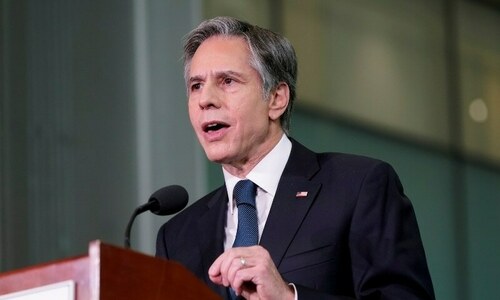TEHRAN: Iran and Venezuela signed a 20-year deal on cooperation between the two allies subject to US sanctions during a visit on Saturday to the Islamic republic by Venezuelan President Nicolas Maduro.
The inking of the agreement “shows the determination of the high-level officials of the two countries for development of relations in different fields,” Iranian President Ebrahim Raisi said.
Maduro, speaking at a joint news conference in Tehran, said the cooperation covered the energy and financial sectors as well as plan to “work together on defence projects”.
Alongside the likes of Russia, China, Cuba and Turkey, Iran is one of Venezuela’s main allies. And like Venezuela it is subject to tough US sanctions.
Resistance will work and will force the enemy to retreat, says Iranian president
“Venezuela has passed hard years but the determination of the people, the officials and the president of the country was that they should resist the sanctions,” Raisi said during the news conference.
“This is a good sign that proves to everyone that resistance will work and will force the enemy to retreat,” the Iranian president added.
In addition to the 20-year accord inked by the two countries’ foreign ministers, Iran and Venezuela signed documents on cooperation in the political, cultural, tourism, economic, oil and petrochemical fields, state news agency IRNA said.
“We have important projects of cooperation between Iran and Venezuela in the fields of energy, petrochemical, oil, gas and refineries,” Maduro said.
Direct flights From July 18, direct flights would operate between Caracas and Tehran in order to promote tourism and the union between our countries, Maduro said, adding that Venezuela was open to receive tourists from Iran.
Iran’s president said direct flights would pave the way for enhanced trade and economic relations as well as bringing the two nations closer together.
The two presidents took part via videoconference in a ceremony marking the delivery of the second of four Iranian-built oil tankers to Venezuela, IRNA reported.
Ties between the two oil producers were strong under the late Venezuelan socialist leader Hugo Chavez and have been further bolstered under his successor Maduro.
In May, Iran’s Oil Minister Javad Owji met Maduro during an official visit to Venezuela, which sits on the world’s largest proven crude reserves. Owji also held talks with his Venezuelan counterpart Tareck El Aissami on how best to cope with US economic sanctions.
The oil minister’s trip to Venezuela came just weeks after a surprise visit by US officials following the sharp rise in world oil prices triggered by Russia’s invasion of Ukraine in February.
Published in Dawn, June 12th, 2022













































